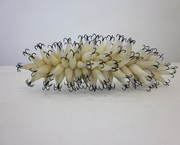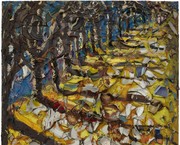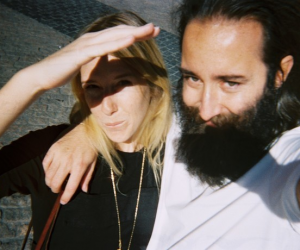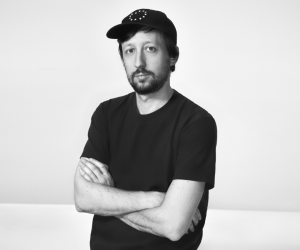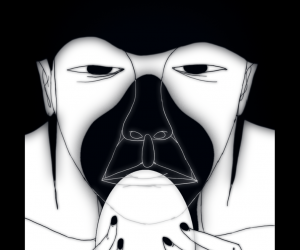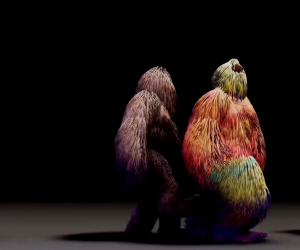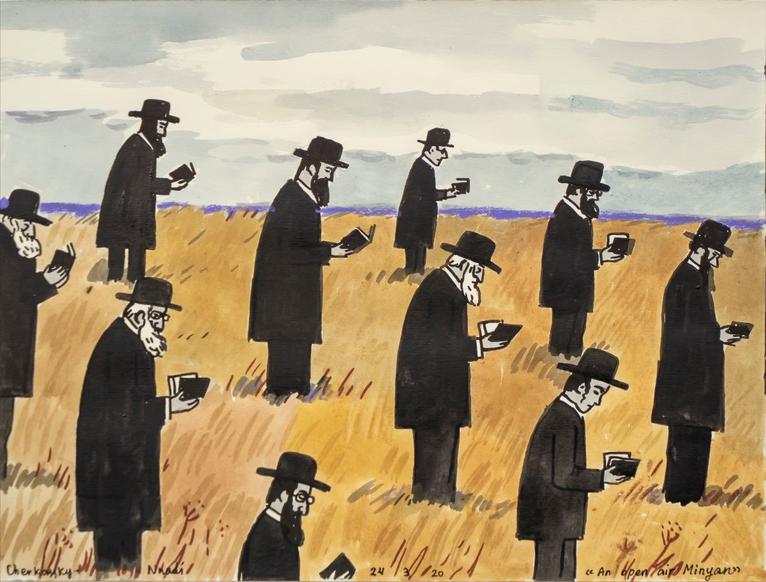
Zoya Cherkassky: Lost Time
Posted by Fabio 8 April 2020
An exhibition of new drawings by Kiev-born, Tel-Aviv based artist Zoya Cherkassky. This exhibition is the second in Fort Gansevoort’s ongoing online series, SEEING THROUGH YOU.
Lost Time debuts nineteen paintings on paper Cherkassky has made – one completed each day – since the onset of the global coronavirus pandemic. Confined to her home studio, the artist has tapped into a collective imagined world of a pre-WWII Jewish life in Eastern Europe as an allegorical vehicle for contemplating our current crisis. Portraits, domestic scenes, and images of timeless rituals, by turns charming and haunting, are captured through a lens of dark nostalgia. “We see Shtetl and Yiddish culture as something that was totally destroyed with the Shoah,” explains Cherkassky. “These drawings are similar to the feeling we have right now, that the world will never be the same.”
Timed to coincide with the beginning of Passover, ‘Lost Time’ is organized with noted curator and writer Alison M. Gingeras, who has written a group of short diaristic essays in response to specific works on view. ‘Lost Time’ is the culmination of the several weeks of daily personal exchanges between Cherkassky and Gingeras.
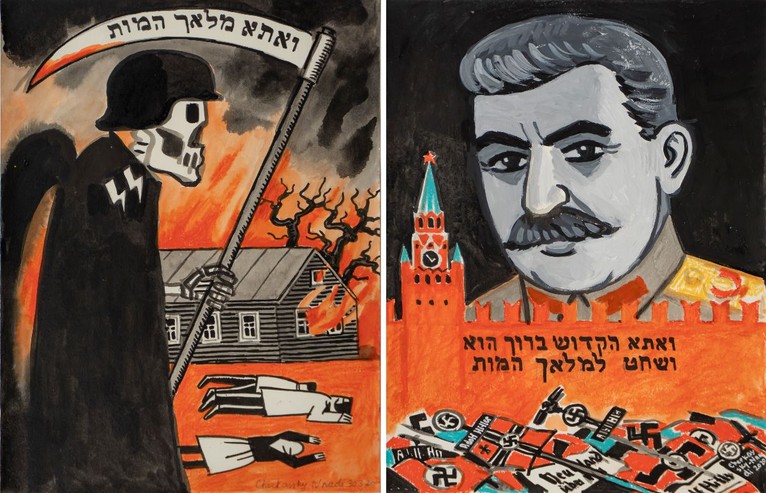 The exhibition’s title refers to the now-vanished world of Eastern European Jewish society before the Holocaust. Cherkassky’s drawings include such images of traditional Jewish home life as an archetypal Shabbos (Sabbath) family dinner, a family strolling in the Shtetl, a Rabbi teaching children the alphabet, and a family celebrating the Passover Seder. In Gingeras’ words, “Zoya’s Jewish family offers us an allegorical portrait of this moment: an imposed ritual of sitting at home, with our thoughts toggling back and forth between memories of things past and anxious projections of an undefined future.”
The exhibition’s title refers to the now-vanished world of Eastern European Jewish society before the Holocaust. Cherkassky’s drawings include such images of traditional Jewish home life as an archetypal Shabbos (Sabbath) family dinner, a family strolling in the Shtetl, a Rabbi teaching children the alphabet, and a family celebrating the Passover Seder. In Gingeras’ words, “Zoya’s Jewish family offers us an allegorical portrait of this moment: an imposed ritual of sitting at home, with our thoughts toggling back and forth between memories of things past and anxious projections of an undefined future.”
The work that launched ‘Lost Time’ is “Black Chuppah,” which points to the practice of Plague weddings – also known as Black weddings – held in Jewish cemeteries. In early March, Cherkassky happened upon a recently uploaded YouTube video documenting a contemporary Plague wedding in a nearby cemetery outside Tel Aviv. This surprising footage led her to investigate a historical practice that emerged in the 19th century across Eastern Europe as a response to the Cholera epidemics of that time. It was believed among Jews that arranging a marriage between two orphans or disadvantaged members of society on the burial grounds of the dead, would be a means to ward off disease and destruction. As Gingeras notes, “Magical thinking and superstitious appeasements aside, these black chuppahs are allegories of hope and human continuity.”
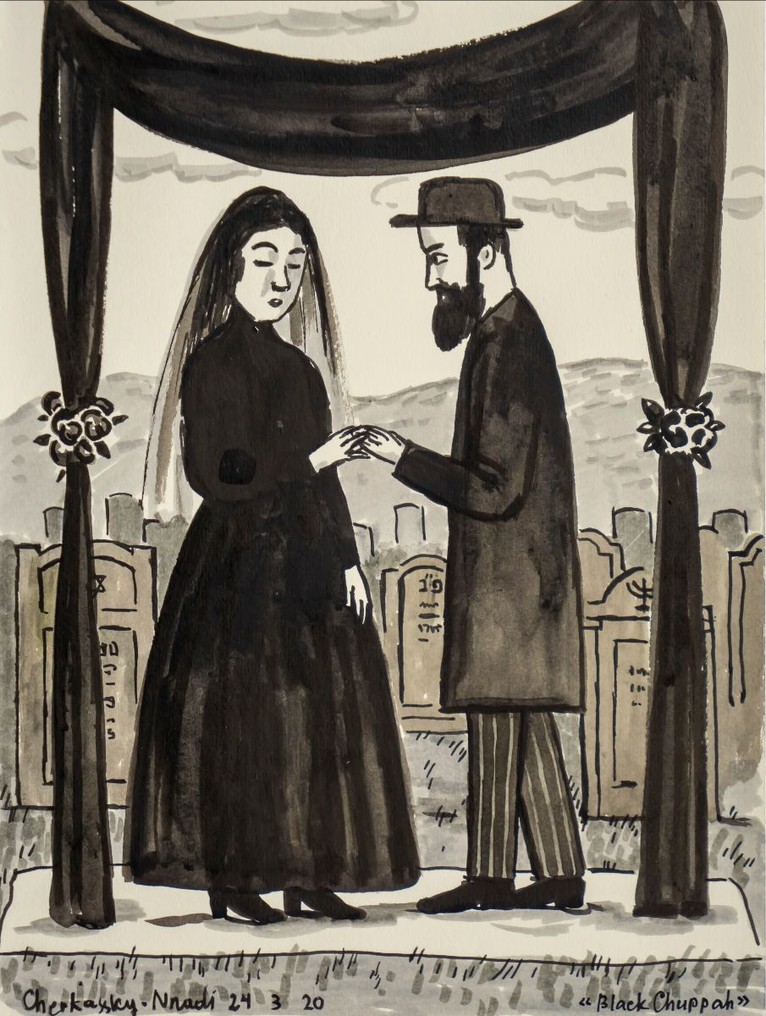 In contrast to her more tranquil scenes, Cherkassy has also made reference to traumatic collective memories in ‘Lost Time.’ Several drawings were inspired by the story of Anne Frank, whose harrowing diary of confinement holds particular resonance for the multitude of people now in quarantine across the globe. While Cherkassky is careful to reiterate that she is not implying a direct correlation between our present struggles and the Nazi genocide, she nevertheless offers, “Fear is fear.” Historical traumas such as the anti-Semitic pogroms of Russian shtetls, and references to the Nazi death machine in her illustrations of the Passover song “Chad Gadya,” conjure not only our current experience of anxiety and distress in the face of a deadly epidemic, but also an enduring humanist belief in perseverance through great suffering and collective sacrifice for a greater good. These parallel tracks are referenced in Cherkassky’s invocations of Passover, the annual celebration of Jews’ liberation from slavery in Egypt: this major Jewish holiday coincides each year with the return of spring, as generations gather around the family table to read together from the haggadah, a testament to survival.
In contrast to her more tranquil scenes, Cherkassy has also made reference to traumatic collective memories in ‘Lost Time.’ Several drawings were inspired by the story of Anne Frank, whose harrowing diary of confinement holds particular resonance for the multitude of people now in quarantine across the globe. While Cherkassky is careful to reiterate that she is not implying a direct correlation between our present struggles and the Nazi genocide, she nevertheless offers, “Fear is fear.” Historical traumas such as the anti-Semitic pogroms of Russian shtetls, and references to the Nazi death machine in her illustrations of the Passover song “Chad Gadya,” conjure not only our current experience of anxiety and distress in the face of a deadly epidemic, but also an enduring humanist belief in perseverance through great suffering and collective sacrifice for a greater good. These parallel tracks are referenced in Cherkassky’s invocations of Passover, the annual celebration of Jews’ liberation from slavery in Egypt: this major Jewish holiday coincides each year with the return of spring, as generations gather around the family table to read together from the haggadah, a testament to survival.
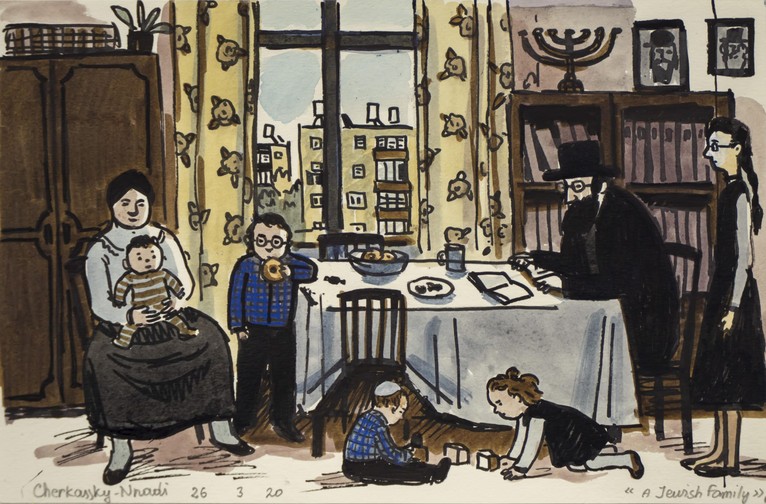 Lost Time is accompanied by Cherkassy’s own illustrated haggadah, an artist’s book produced in an edition of 100 copies.
Lost Time is accompanied by Cherkassy’s own illustrated haggadah, an artist’s book produced in an edition of 100 copies.
Zoya Cherkassky
Lost Time
Fort Gansevoort’s web series SEEING THROUGH YOU
Wednesday, April 8th – Sunday, May 10th, 2020
View the exhibition online here



